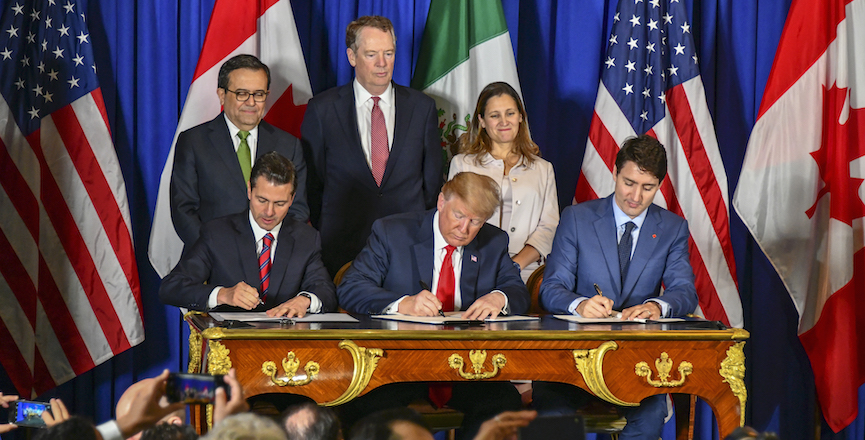Donald Trump likes to smash things, such as the U.S. commitment to the Paris climate accord and the Iran nuclear deal. Occasionally he smashes bad things, perhaps inadvertently, opening a crack and the light gets in.
One crack is the removal of the energy proportionality clause from the new NAFTA. It compelled Canada to offer the U.S. first access to the majority of our oil and gas.
Although never invoked, its spectre helped merge Canada’s energy resources into U.S. supplies, ended our energy sovereignty, and imperilled energy security for eastern Canadians. If retained, it would have blown a hole in Canada’s climate plans.
When Canada ratifies the new NAFTA this month, the old NAFTA will automatically die. The U.S. and Mexico have already ratified the USMCA, as Washington calls the new deal. Strangely, ratification will suspend but not terminate NAFTA’s predecessor, the 1989 Canada-U.S. Free Trade Agreement. Miraculously, like a zombie the FTA could spring back to life should the USMCA die in the mandatory sunset review in 2026.
Who could the FTA’s reanimated corpse haunt? Canada’s climate plan for one.
In 1989, the FTA’s framers had no inkling of the coming age of climate emergency, or if they did, they chose to ignore it. Proportionality’s obligation for Canada to make available for export to the U.S. the majority of our oil and natural gas was put in the FTA and transferred unchanged to NAFTA (Article 605). Mexico got exempted on sovereignty grounds.
The rule forbade Canada from reducing oil exports to the U.S. like it did during international oil shortages in the 1970s so domestic oil could be sent to Eastern Canadians to protect them from freezing in the dark. That act infuriated the foreign-dominated oil industry in Alberta. They worked with Alberta’s Conservative government to get a separate energy chapter in the FTA to prevent Ottawa from pursuing a Canada-first energy policy ever again.
What a difference 30 years makes. Alberta’s current restriction on oil production to boost oil prices likely violates proportionality. Fracking and shale oil have made the U.S. the world’s greatest oil producer, with less need for oil from Alberta producers. The latter demand pipelines to tidewater to find markets outside the U.S. The FTA is badly out of date.
Chrystia Freeland oversaw negotiations on the USMCA and waxed enthusiastically about ditching the “energy ratchet clause,” her name for the energy proportionality rule. It “committed us to selling a certain portion of our energy exports to the United States,” she exclaimed. It impinges on our sovereignty.
I was pleasantly shocked. No Canadian government official has talked positively about Canadian energy sovereignty since the 1989 FTA.
It’s good to see energy proportionality die along with NAFTA. But we must guard against it snapping back under a resuscitated FTA. The USMCA is subject to review every six years, at which point the U.S., Mexico, and Canada can decide to extend or kill it. If a future U.S. president decides the USMCA is the “worst deal ever” and ditches it, the FTA will automatically snap back.
Its return would hinder Ottawa and the provinces from phasing out the production of oil and natural gas in Canada’s transition to a net-zero carbon future. This is a serious barrier because the production of oil and gas, mainly for export, is Canada’s largest and fastest growing source of greenhouse gases. Canada cannot reach net-zero emissions by 2050 if the FTA’s energy proportionality clause is revived and enforced.
I have not discussed whether the USMCA is a net benefit to Canada. I am not a fan of its bias to corporations that are given the right to enter the three countries and be treated as citizens. That bias encouraged the movement of investment to low wage regions and hollowed out good paying jobs in Canada and Northern U.S. states. Meanwhile, people in the three countries are denied rights of entry and citizenship.
Whatever one’s position on the USMCA’s merits, all sides should agree that while Ottawa ratifies it and kills NAFTA, it also kills the FTA. Zombies are fun in movies, but less so in real life. Why leave a cudgel lying around for a future Trump-like U.S. [resident to use against us?




